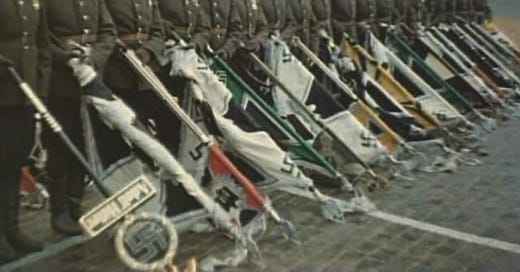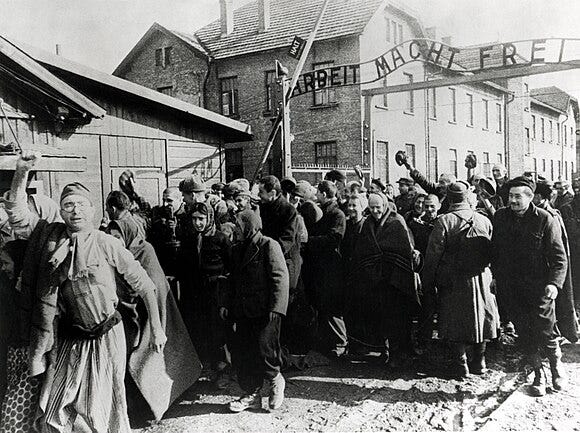The Red Army
If you were to ask an American politician in the year 2024 whether they celebrate Victory Day, presumably you would receive a puzzled look instead of a shared nod of celebration.
This year, instead of remembering the American perspective to the end of World War II, take a moment to ponder on the Red Army and over 26 million (some estimates are even higher) their sacrifices which are still felt today, and in some cases, still being found in the dirt where they perished 75+ years later.
Twenty-four years of discipline and labor have created an eternal glory, the name of which is the Red Army.
Anyone who loves freedom owes such a debt to the Red Army that it can never be repaid.
But we can declare that the Soviet Union will receive the arms, money, and provisions it needs. Anyone who fulminates against Hitler should consider the Red Army a heroic model which must be imitated.
-Ernest Hemingway
Liberation of the Camps
As you take a few moments to learn about Victory Day, the history of the Eastern Front, or just want a few excerpts before tackling your day, if you’re an American, it is unlikely you have been able to read the perspectives of a Red Army soldier, or someone liberated by the Red Army. Below are a few excerpts from Dan Stone’s book Liberation of the Camps.
Red Army Perspective:
To the extent that we can access the Red Army's views, it is through memoirs and letters. Vasily Gromadsky, an officer of the 60th Army, offered this description:
I realized that they were prisoners and not workers so I called out, 'You are free, come out!"... They began rushing towards us, in a big crowd. They were weeping, embracing us, and kissing us. I felt a grievance on behalf of mankind that these fascists had made such a mockery of us. It roused me and all the soldiers to go and quickly destroy them and send them to hell."
Georgi Elisavetskii, another of the first Soviet soldiers to enter the camp, admitted in 1980 that 'My blood runs cold when I mention Auschwitz even now. He described the liberation in dramatic detail:
When I entered the barrack, I saw living skeletons lying on the three tiered bunks.
As in fog, I hear my soldiers saying: 'You are free, comrades!' I sense that they do not understand [us] and begin speaking to them in Russian, Polish, German, Ukrainian dialects; unbuttoning my leather jacket, I show them my medals... Then I use Yiddish.
Their reaction is unpredictable. They think that I am provoking them. They begin to hide. And only when I said to them: 'Do not be afraid, I am a colonel of Soviet Army and a Jew. We have come to liberate you' ... Finally, as if the barrier collapsed... they rushed towards us shouting, fell on their knees, kissed the flaps of our overcoats, and threw their arms around our legs. And we could not move, stood motionless while unexpected tears ran down our cheeks.
Liberated Perspective:
Of the inmates who were in Auschwitz's hospital at the moment of liberation, none came to be more celebrated than Primo Levi. It is impossible to do justice to the complexity of ideas and simplicity of prose with which Levi describes his liberation (as with everything he writes about). It is thus worth citing a long passage, which follows the arrival of four Soviet horsemen riding along the road outside the barbed-wire perimeter of the camp:
They did not greet us, nor did they smile; they seemed oppressed not only by compassion but by a confused restraint, which sealed their lips and bound their eyes to the funereal scene. It was that shame we knew so well, the shame that drowned us after the selections, and every time we had to watch, or submit to, some outrage: the shame the Germans did not know, that the just man experiences at another man's crime; the feeling of guilt that such a crime should exist, that it should have been introduced irrevocably into the world of things that exist, and that his will for good should have proved too weak or null, and should not have availed in defence.
More than any other author of a Holocaust testimony, Levi captures the swirling, mixed emotions to which liberation gave rise:
So for us even the hour of liberty rang out grave and muffled, and filled our souls with joy and yet with a painful sense of pudency, so that we should have liked to wash our consciences and our memories clean from the foulness that lay upon them; and also with anguish, because we felt that this should never happen, that now nothing could ever happen good and pure enough to rub out our past, and that the scars of the outrage would remain within us forever, and in the memories of those who saw it, and in the places where it occurred and in the stories that we should tell of it. This confusion, this simultaneous 'attack of mortal fatigue' that accompanied the joy of liberation' accounts for 'why few among us ran to greet our saviours, few fell in prayer’




